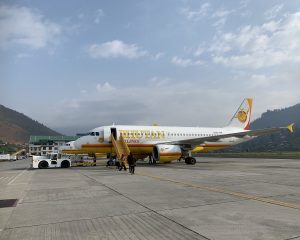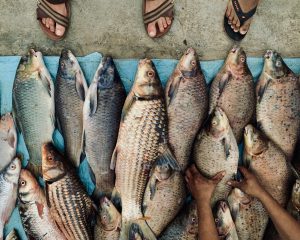World Cup fever, airport bribes, and a decapitated white horse blocking bridge traffic. Remembering my first visit to Nigeria.

The first time I went to Nigeria was in the early summer of 1998. I was a journalist covering Africa for an American news magazine, and I had gone there to report on the death of the country’s military ruler, Gen. Sani Abacha, who had died two days earlier, apparently from a Viagra-induced heart attack and in the company of three Ukrainian women, none of whom was his wife Maryam. News reports later claimed the women were actually Indian. Whatever the general’s prostitutional preferences, he was now dead. What was also not in dispute was that Nigeria was better off without him. As Nigerian dictators went, Abacha had been the worst.
To get to Lagos from Nairobi, where I lived at the time, I had to first fly to Amsterdam; there were no direct flights from Kenya to Nigeria then. The only other non-Nigerians on the KLM flight were two European businessmen who I surmised worked for an oil company. There were, as far as I could tell, no tourists on the flight, and certainly no other journalists. During the military years, it was virtually impossible to get a journalist visa for Nigeria. You had to lie and say you were going there in some other capacity, and even then Nigerian consulates were liable to turn you down, though some of them were quite happy to accept the application fee.
An Irish journalist friend of mine, however, had tipped me off that the Nigerian embassy in Addis Ababa was not particularly fussed about doing background checks on their applicants. So, while on another assignment in Ethiopia six months earlier, I’d taken the opportunity to apply for a business visa, claiming to be an art dealer. I had been surprised at the ease with which the ruse had succeeded. Overnight, I was given a 12-month multiple-entry visa. Maybe it had something to do with my Swedish passport: how threatening could an art-dealing Swede really be to the national security interests of Nigeria? I must say I was disappointed not to have to answer questions about early Yoruba wood carvings, which I spent several minutes researching before arriving at the consulate with my freshly printed business cards at the ready.
So, when the news broke of Abacha’s death, I was one of the few foreign journalists with a Nigerian visa in my passport. I left right away and the next evening I arrived at the Murtala Muhammed Airport in Lagos, named after a brigadier (later general) who, in 1975, at the age of 36, had been made head of state when the country’s previous military ruler was overthrown while attending an Organization of African Unity summit in Kampala, Uganda. To have the country’s main airport named after him, young Muhammed must have made a remarkable impression on the Nigerian nation considering his short time in office. Less than seven months after taking power, he was assassinated in an abortive coup attempt. Maybe it was because he didn’t spend longer time in office that his tenure had been cast in such a favorable light; he simply didn’t have enough time to screw things up.
The airport bearing his name had long since acquired a reputation as one of the worst airports in the world. There were stories of airliners landing in Lagos and being attacked by criminals and robbed of their cargo holds while taxiing to the terminal. I had made sure of not checking any luggage. But I needn’t have worried: we were safely delivered to the gate without incident. Inside the airport, it was humid and claustrophobic. Lights flickered on and off, the air conditioning wasn’t working, and the moving walkway that should have speeded up our passage from the gate looked like it had stopped moving soon after the terminal was constructed in 1979. I had read that the Lagos airport had been modeled after Amsterdam’s Schiphol Airport, but somehow I didn’t see the resemblance.
I had been told to expect demands for bribes from immigration officers and customs agents, but both the European businessmen ahead of me in the “foreigner” line at the passport control and I made it through the first stop without any hassles. At the customs counter, I was told to open my luggage and remove its contents – clothes, toiletries, shoes.
“Anything for me?” the agent asked.
A sign on the wall behind him read: “No Bribes.”
“No, not really,” I answered.
“Maybe next time,” he replied, and motioned for me to put my stuff back in the suitcase.
I had left for the trip in such a hurry that I didn’t have time to properly organize the logistics. I had not, for example, arranged for any transportation to get to my hotel. So I accepted an offer for a taxi ride from the first driver who approached me in the arrival hall. I told him I was going to an Italian guesthouse on Victoria Island, which had come recommended to me by a political officer at the US Consulate in Lagos with whom I’d talked on the phone from Nairobi. The driver didn’t know the place, but of course he knew Victoria Island. He took my bag and we stepped into the Nigerian night, the air outside hot and humid, no different from inside.
I had been told that Lagos had some of the worst traffic in the world, but the roads that evening were eerily quiet. “Because of the politics,” the driver explained. I asked him about those politics, but what I remember is talking to him about the World Cup in France, which had started two days earlier – on the day Abacha had died – and Nigeria’s chances in it. The Super Eagles had a good team, he replied excitedly, maybe they could improve on results from the cup four years earlier when Nigeria had come within minutes from knocking out Italy, the eventual finalists, in the round of 16, the furthest any African team had advanced in a World Cup. I agreed, that would be great.
The guesthouse was nice, small, with marble floors and roaring air conditioning, though quite expensive: $300 a night, payable in advance and in US cash only. In my room, I turned on the TV just in time for the 9 o’clock newscast. A female anchor welcomed viewers. I wasn’t sure if this was state television or if Nigeria even had private television channels. Whatever it was, I assumed the newscast would lead with the politics.
“Good evening,” the anchor said, solemnly. “In the World Cup today, Norway and Morocco drew 2-2. Here are the highlights.” What followed was five minutes of highlights from a World Cup match that didn’t even feature the Super Eagles. When the newscast finally cut back to the studio, the anchor looked sternly into the camera and said: “In other news, the death of the country’s president …”
Priorities.
The next morning, the driver returned to the hotel to take me to my first appointment, which was with the political officer at the US Consulate. It was Thursday morning. The magazine’s filing deadline was Friday, which meant I had two days to find out what was going on. Two days to figure Nigeria out. What was the real story? According to the political guy, it was about oil. Oil and gas accounted for essentially all of Nigeria’s export earnings – the country didn’t produce anything else that the rest of the world wanted – and an increasing amount of the black stuff was being sent to the United States. I scribbled down some notes. Oil was always good angle for the magazine I worked for.
To the academics, human rights activists and local journalists on my interview itinerary, the story was democracy — and Nigeria’s need for it. Nigerians were sick of military regimes, they told me. The only person capable of leading Nigeria forward was Moshood Abiola, a businessman who had run for president in the 1993 elections and been on his way to winning when then-military president Ibrahim Babangida annulled the voting results, citing corruption and fraud (even though international observers had declared it Nigeria’s freest and fairest presidential election to date).
I didn’t know much about Abiola and his story. After the annulled elections, Gen. Abacha had taken power. Abiola responded, in 1994, by declaring himself the lawful president of Nigeria, for which he was promptly arrested and thrown in prison by the military regime. Abiola, or MKO as he was known by the initials of his first names, had languished there ever since. Now, his supporters said, it was time to release him and give him his rightful place as president. Only he had the legitimacy to rule Nigeria, they said.
The ruling military did not agree. Immediately upon Abacha’s death, Gen. Abdulsalami Abubakar had been installed as head of state in a transitional government, promising to hold elections within a year and transfering power to an elected government. Most people didn’t seem to believe his promises, something that was amply demonstrated to me the following day during an impromptu pro-democracy rally in Lagos where protesters denounced the military and called for Abiola’s release. It didn’t take long for the police to show up and begin firing tear gas and rubber bullets. All I remember is running, my eyes stinging worse with each step. It seemed like an important event at the time.
On our way back to Victoria Island, the traffic coming off the Third Mainland Bridge slowed to a standstill. The driver said there must have been an accident. Descending the off-ramp, we could see what was blocking traffic. In the middle lane lay a large white horse with its head cut off. When I asked the driver what a decapitated white horse was doing in the middle of the street, he responded by telling me another story about how divers recently had gone looking for a missing body in the Lagos lagoon only to fish up three different corpses. Presumably the story about the divers had nothing to do with the dead horse, but somehow it didn’t seem out of place to tell it.
Back at the hotel, my editor called me. He wanted to know what my take was on things before I started writing the story. I said something about Nigeria being at a crossroads, but that didn’t seem to impress him too much. “We want you to tell us if Nigeria is going in the right direction or in the wrong direction,” he said.
Up or down, in other words.
“I suppose things don’t look so good,” I said.
“OK,” he said. “Write that. Seven-hundred words.”

